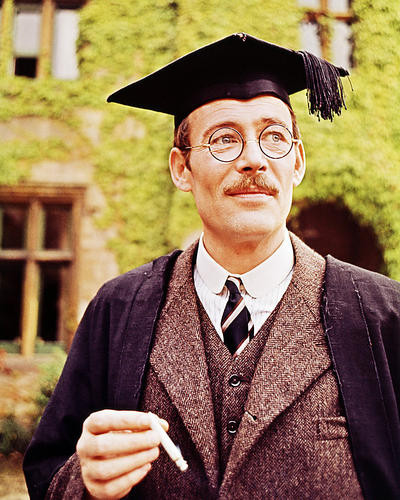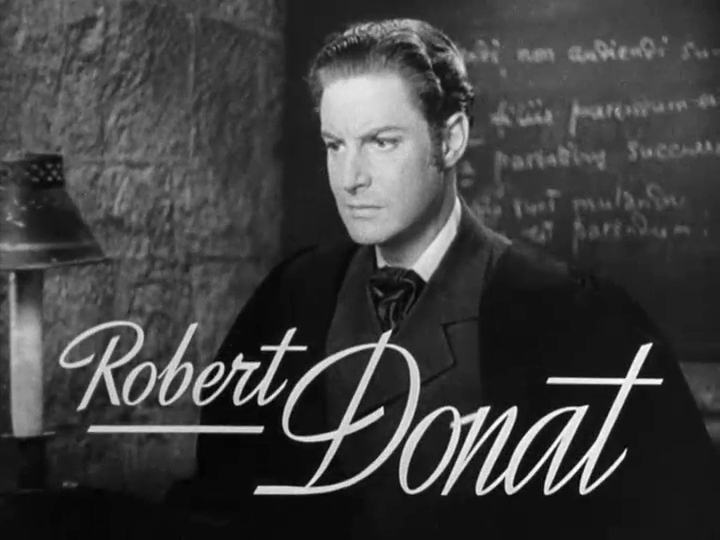Variations on the same theme: Goodbye, Mr Chips (1939 and 1969)
No dia 15 de outubro o Dia dos Professores é
celebrado no Brasil. Eu fui moldada pelos professores que eu tive. Não apenas
os que me deram aula, mas especialmente por minha mãe, que esteve em sala de
aula por 38 anos ensinando matemática. É por causa dela que eu amo filmes sobre
professores. Desta vez trago duas versões da mesma história, filmadas com 30
anos de diferença, sobre um mestre inspirador.
On October 15th, Teacher’s Day is celebrated in Brazil. I’ve been greatly shaped by the teachers I had. Not only the ones who taught me classes, but especially my mother, who was inside classrooms teaching math for 38 years. That’s why I love movies about teachers. This time I bring two versions of the same story, filmed 30 years apart, about an inspiring master.
Em 1939, Charles Chipping (Robert Donat) tem 83
anos e leciona há impressionantes 63 anos. Impossibilitado a ir a uma aula
inaugural pela primeira vez por causa de uma gripe, ele rememora sua trajetória.
Em seu primeiro dia, foi-lhe pregada uma peça por seus alunos e teve problemas
para manter a ordem. O aluno mais difícil de controlar é Colley (Terry
Kilburn).
In 1939, Charles Chipping (Robert Donat) is 83 years old and has been teaching for impressive 63 years. Unable to go to the inaugural class for the first time due to a cold, he remembers his trajectory. On his first day, he was pranked by his students and had a rough time mantaining peace and order. The hardest student to control is Colley (Terry Kilburn).
Anos depois, já um homem de meia-idade mas
ainda um professor impopular, o Sr Chipping viaja para as montanhas com um
colega de trabalho e lá conhece Kathy Ellis (Greer Garson em seu primeiro papel
no cinema). Eles se encontram novamente em Viena, se divertem muito e se casam.
Ela dá a ele o apelido “Chips” e começa a convidar os alunos dele para tomarem
chá na cada deles. De repente Chips se torna um professor popular e até conta
piadas na sala de aula! Os tempos mudam, a Escola Brookfield para garotos também,
mas Chips não muda os tempos – então decidem aposentá-lo contra a vontade dos
alunos.
Years later, already a middle-aged man but still an unpopular teacher, Mr Chipping travels to the mountains with a colleague and there he meets Kathy Ellis (Greer Garson in her film debut). They run into each other again in Vienna, have a wonderful time together and get married. She gives him the nickname “Chips” and start hosting teapartys in their residence for his students. Suddenly Chips becomes a popular teacher and even tells jokes in class! Times change, the Brookfield School for Boys too, but Chips doesn’t change with the times – so they decide to retire him against the students’ will.
Em 1969 somos informados de que nossa história
começa em 1924. Arthur Chipping (Peter O’Toole) é um professor impopular na Escola
Brookfield. De férias em Pompeia, ele volta a encontrar a estrela de teatro
musical Katherine Bridges (Petula Clark) e eles se divertem muito juntos. De
volta a Londres, eles se casam. No primeiro encontro ela já o havia apelidado
de “Chips”.
In 1969 we’re informed that our story begins in 1924. Arthur Chipping (Peter O’Toole) is an unpopular teacher at the Brookfield School. While on vacation in Pompeii, he meets again the musical theater actress Katherine Bridges (Petula Clark) and have a wonderful time together. Back in London, they get married. On their first meeting she had already nicknamed him “Mr Chips”.
Por volta dos 15 minutos de projeção temos uma
baita surpresa quando o Sr Chips começa a cantar. Ele canta sobre a passagem do
tempo e sobre como o mundo ficou mais colorido depois que ele se casou com
Kathy. Petula Clark é quem mais canta neste filme que eu não esperava ser um
musical, mas Peter O’Toole foi ousado e cantou sem usar dublagem.
At around the 15-minute mark we’re greatly surprised when Mr Chips starts to sing. He sings about the passage of time and how the world got more colorful after he married Kathy. Sure, Petula Clark does the majority of the singing in this film I wasn’t expecting to be a musical, but Peter O’Toole was fierce and did his own singing.
Em 1939, o Sr Chips é Chefe do Departamento na
escola durante a Primeira Guerra Mundial. Em 1969, ele vivencia a Segunda
Guerra Mundial, em meio à possibilidade de ataques aéreos à escola. Em ambas as
versões o Sr Chips sofre diversas perdas durante as guerras, ficando enlutado
por causa de pessoas queridas.
In 1939, Mr Chips served as a headmaster of the school during World War I. In 1969, he goes through World War II, with the possibility of airplane attacks to the school. In both versions Mr Chips faces several losses during the wars, grieving those he loved.
Além do período em que se passa a história, a
maior mudança de uma versão para a outra foi Kathy. Em 1939 ela tem pouco tempo
em cena mas é fundamental para fazer do Sr Chips um professor e uma pessoa mais
afável. Em 1969, com uma profissão e uma reputação, ela é co-protagonista e o
casamento dura muito mais.
Besides the time frame, the main change from one version to the other was Kathy. In 1939 she is given little screen time but is pivotal to make Mr Chips a more likeable teacher and person. In 1969, with a profession and a reputation, she is a co-lead and her marriage lasts for a much longer time.
A versão de 1939 agradeceu nos créditos a ajuda
de Sidney Franklin – diretor não-creditado do filme – e a inspiração fornecida
pelo finado Irving Thalberg. O filme foi produzido por Victor Saville, que
produziu alguns dos primeiros trabalhos de um jovem desconhecido chamado Alfred
Hitchcock. Assim como Hitch, Saville também dirigiu filmes de suspense na
Inglaterra no começo dos anos 1930. De acordo com o IMDb, ele produziu 39
filmes entre 1923 e 1962.
The 1939 version acknowledged in the credits the help of Sidney Franklin – uncredited diretor of the movie – and the inspiration of the late Irving Thalberg. The movie was produced by Victor Saville, who produced some of the early films by a then-unknown named Alfred Hitchcock. Like Hitch, Saville also directed thrillers in England in the early 1930s. According to IMDb he produced 39 movies between 1923 and 1962.
A versão de 1969 foi dirigida por Herbert Ross
e produzida por Arthur Jacobs, que havia recém produzido “O Fabuloso Dr Dolittle” (1967). Esta foi a estreia de Ross na direção – ele antes trabalhava como
coreógrafo. Jacobs queria Rex Harrison, que fez o papel de Dolittle, para ser o
Sr Chips, mas ele recusou o papel. Outros nomes considerados foram Richard
Burton, Christopher Plummer, Peter Sellers, Albert Finney, Richard Harris e
Paul Scofield.
The 1969 version was directed by Herbert Ross and produced by Arthur Jacobs, who had just produced “Dr Dolittle” (1967). This is Ross’ directing debut – he had been working as a choreographer before. Jacobs wanted Rex Harrison, who played the part of Dolittle, to be Mr Chips, but he refused. Other names considered were Richard Burton, Christopher Plummer, Peter Sellers, Albert Finney, Richard Harris and Paul Scofield.
Robert Donat ganhou seu Oscar de Melhor Ator
por “Adeus, Sr Chips” mas não viveu até os 83 anos como seu personagem. Na
verdade, ele tinha apenas 53 anos quando morreu, depois de completar “A Moradada Sexta Felicidade” (1958). Por sua vez, Peter O’Toole foi indicado a um Oscar por
sua performance como o Sr Chips e viveu até os 81 anos. O’Toole foi indicado
para oito Oscars, mas nunca ganhou o prêmio.
Robert Donat won his Best Actor Oscar for “Goodbye, Mr Chips” but never lived to be 83 like his character. In fact, he died at only 53, after completing “The Inn of the Sixth Happiness” (1958). On the other hand, Peter O’Toole was nominated for an Oscar for his performance as Mr Chips and lived to be 81. O’Toole was nominated for eight Oscars, but never won the award.
Além da minha mãe, essa dupla de filmes me fez
lembrar outro professor de matemática: Júlio César de Mello e Souza, conhecido pelo
seu pseudônimo Malba Tahan. Um professor e também escritor de sucesso, ele
faleceu poucas horas depois de dar aula. Seu aniversário, seis de maio, é
celebrado como Dia Nacional da Matemática.
Besides my mother, the duo of movies reminded me of another math teacher: Júlio César de Mello e Souza, known for his pseudonym Malba Tahan. A teacher as well as a successful wirter, he died mere hours after teaching a class. His birthday, May 6th, is celebrated as National Math Day.
Em seu discurso de aposentadoria o Sr Chips
conta a seus alunos que ele pode ter dificuldades de reconhece-los no futuro
porque na sua cabeça eles permanecem jovens. Ele também diz que é mentira que
ele nunca teve filhos: ele teve milhares deles! Quando perguntada sobre isso,
minha mãe não chegou a considerar seus alunos como filhos. Eu, sua única filha,
fiquei aliviada, mas ao mesmo tempo sei como ela é amada e lembrada por seus
alunos por causa do jeito como ela é tratada quando encontramos algum deles.
Como o Sr Chips, ela deixou seu legado.
In his departing
speech Mr Chips tells his students that he may have a hard time recognizing
them when they grow up because in his mind they remain young boys. He also says
that it’s a lie that he didn’t have kids: he had thousands of boys! When asked
about that, my mother didn’t go as far as considering her students as her
children. I, as her only child, am relieved, but at the same time I know how
much she is loved and remembered by her students by the way she is treated
whenever we meet one of them. Like Mr Chips, she left her legacy.
O veredicto: a versão de 1939 tem 40 minutos a
mais, porém é bem mais emocionante que o remake!
The verdict: the
1939 version is 40 minutes shorter but has a lot more heart than the remake!







No comments:
Post a Comment